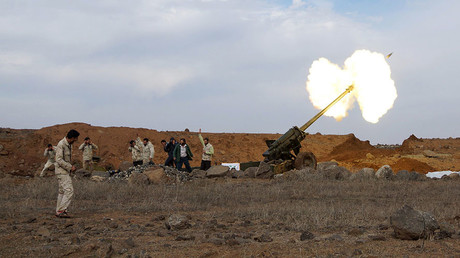The loose coalition of armed opposition groups, united under the US-backed umbrella organization dubbed the Free Syrian Army, issued an official statement on Sunday, in which it claimed that any attack on their individual units will be treated as one on the whole bloc after its formation.
“We – the armed groups from across Syria will form a single bloc, any offensive that takes place in an area where our units are present, will be regarded as an attack against all the units throughout the Syrian territory, and we reserve the right to respond to it,” FSA said in a statement endorsed by 37 military units.
The FSA also rejected the US and Russia-brokered “regime of silence” currently in place in parts of Damascus and Latakia provinces, with negotiations currently underway to extend it to Aleppo as well. The organization slammed the idea of a partial ceasefire in selected areas, saying that they will only accept a full-scale truce that concerns all regions.
“The cessation of hostilities which we have agreed upon, is first of all a comprehensive agreement, which includes the whole territory of Syria, with the exception of the territory under [the] control of ISIS,” the statement said, without mentioning the second internationally-recognized terrorist group, Jabhat al Nusra, which is also excluded from the UN-backed ceasefire deal.
“We will never under any circumstances accept the principle of divisibility or regional truces,” the FSA statement added. In addition the opposition forces said they support the stance of the Saudi-backed High Negotiations Committee who withdrew from Geneva negotiations in April accusing Syrian government of violating the Peace plan for Syria stipulated in the UN Security Council resolution 2254.
READ MORE: ‘Groups sabotaging Syrian truce should be put on UN terrorist list’ – Lavrov
Accusing Damascus of violating a number of items in the resolution on maintaining peace in Syria, the FSA said they “appreciate the position of the High Negotiations Committee on suspension of the Geneva-3 talks and support it.”
Meanwhile the Russian Center for Reconciliation in Syria, which is working on implementing the UN-backed Syria peace roadmap as well as regional ceasefires, said that active negotiations have been taking place in the area of embattled Aleppo and that recently an agreement has been reached with two of Aleppo’s settlements. As of May 1 the number of settlements which joined the truce reached 85, the center reported.
At the same time some 3.5 tons of humanitarian aid were brought to Damascus and Aleppo provinces, Russia’s Defense Ministry said in a statement on Sunday adding that similar convoys are to be delivered to Homs and Hama provinces.
After Syria witnessed a surge in violence over the past week, particularly Aleppo where dozens of civilians fell under heavy shelling and a hospital was hit resulting in at least 50 deaths according to MSF, UN special envoy Staffan de Mistura warned that the truce was on a brink of collapse and needed salvaging.
In an interview with RT, Mistura insisted that both Russia and US bear responsibility to protect and “recalibrate” the cessation of hostilities and make sure that the peace initiative, which he says is the only viable solution for Syria, remains.
While Moscow has been taking active measures, such as conducting negotiations in Aleppo and delivering humanitarian aid to facilitate the conflict, Washington has been actively involved in discussing the situation.
On a hastily arranged trip to Geneva flowing de Mistura’s appeal, the US Secretary of State John Kerry on Sunday said he hoped that “some progress” will be reached in the next two days in the Geneva negotiations.
“The hope is we can make some progress,” Kerry said as quoted by Reuters. “I hope that in the course of the conversations I have here tonight, tomorrow, and the work that the teams are doing… [we can] zero in and pin down the modalities of reaffirming the cessation.”
“These are critical hours, we look for Russia’s cooperation, and we obviously look for the regime to listen to Russia and to respond,” added Kerry, who is due to meet de Mistura on Monday.
The problem in installing a firm ceasefire lies in the fact that the opposition groups are “mixed” with the extremists and the groups “are fighting among themselves” and that the US “don’t know where to go” with all this, Belgian journalist Willy Van Damme told RT.
Meanwhile the decision by the FSA, some of whose factions are known to have cooperated with Al Nusra, not to join local ceasefires puts them on the same line with radical extremists, believes Abayome Azikiwe, editor of Pan-African News Wire.
“When you have groups such as the Free Syrian Army, which the Obama administration says is legitimate opposition group even though they are armed and they are carrying out attacks against the Syrian government when they say they’re not going to participate in the process then, of course, they are objectively siding with the Islamist extremist organizations…” Azikiwe told RT.
“It is the belligerence of whether they claim to be an opposition, moderate opposition or Islamist extremists – they are all involved in the destabilization of the Syrian State,” he added speaking about opposition forces in Syria as a whole.
As the goal of all Syrian opposition to bring about regime change “coincides with the US foreign policy in the region”, Azikiwe believes that Washington is “not serious about any type of comprehensive ceasefire” and is not “forthright in its approach to developing genuine peace in Syria.”
Source Article from https://www.rt.com/news/341572-fsa-rejects-local-syria-ceasefires/?utm_source=rss&utm_medium=rss&utm_campaign=RSS
Related posts:
Views: 0
 RSS Feed
RSS Feed

















 May 2nd, 2016
May 2nd, 2016  Awake Goy
Awake Goy 

 Posted in
Posted in  Tags:
Tags: 
















